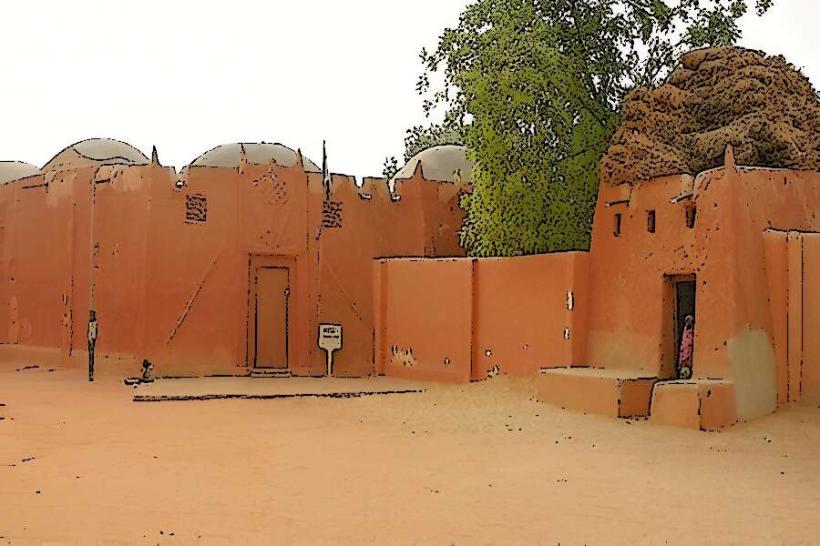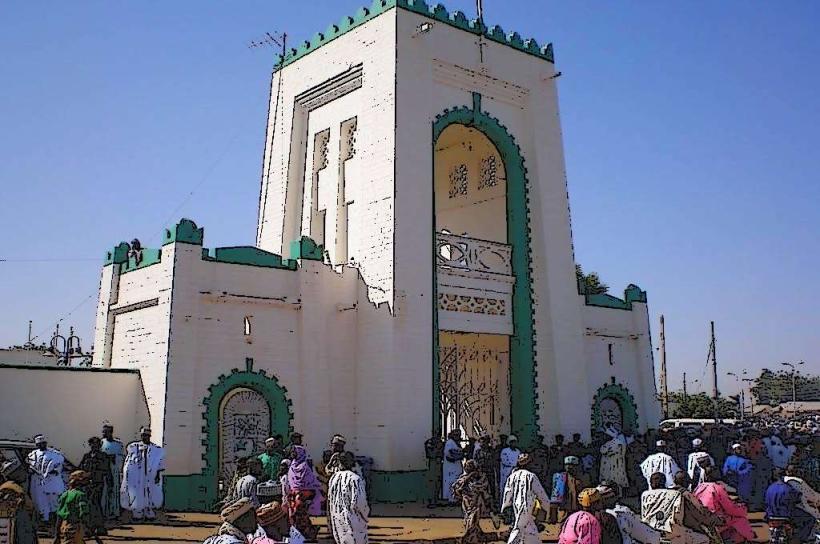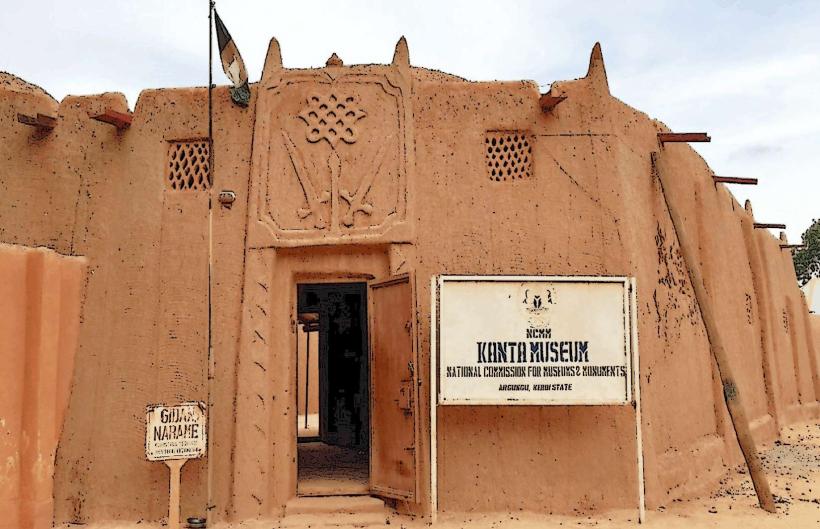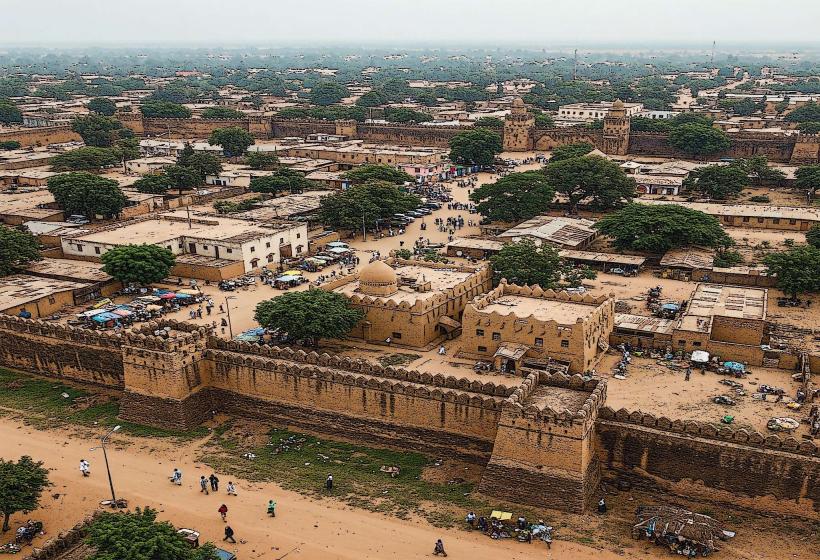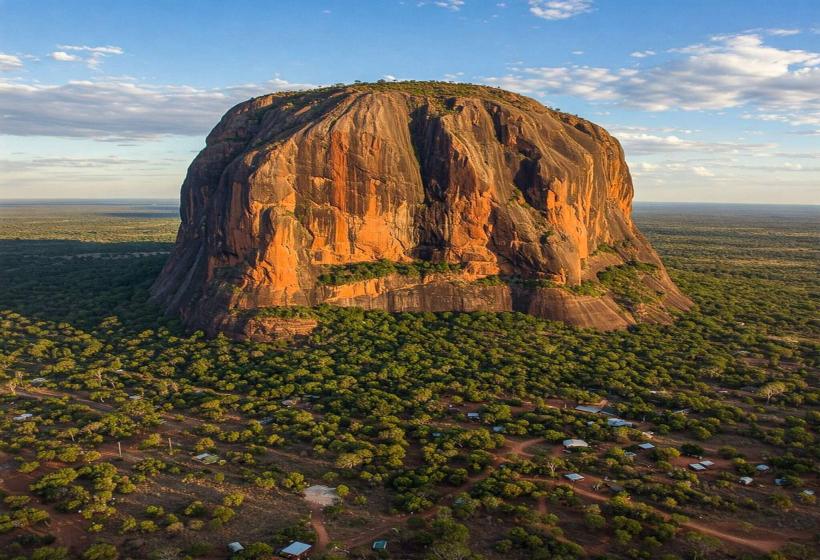Information
City: SokotoCountry: Nigeria
Continent: Africa
Sokoto, Nigeria, Africa
Sokoto serves as the seat of the Sultan of Sokoto and the spiritual capital of Nigeria's Muslim population, as well as the administrative capital of Sokoto State. It is situated in the extreme northwest of Nigeria, near the confluence of the Sokoto and Rima rivers, approximately 80 kilometers from the border with the Republic of Niger.
Historical Timeline
Sokoto was founded in 1804 by Shehu Usman dan Fodio as a military camp during the Fulani Jihad. It transitioned into the administrative capital of the Sokoto Caliphate in 1809 and remained the most powerful empire in sub-Saharan Africa until the British conquest in 1903. The city underwent its most significant political reconstruction following the 1967 creation of North-Western State, which established its role as a modern provincial hub. The primary event shaping its current urban form was the 19th-century caliphate planning, which centralized the city around the Sultan’s Palace and the central mosque.
Demographics & Population
The metropolitan population is approximately 780,000 as of 2026. The population is predominantly Hausa and Fulani. The median age is approximately 18.2 years, reflecting one of the highest youth dependency ratios in the country.
Urban Layout & Key Districts
The city is organized into the "Old City" (Birni), contained within traditional limits, and the newer administrative expansions. Key districts include the Sultan’s Palace area (Central), which serves as the religious core; the Government Reserved Area (GRA) to the south, housing administrative offices and upscale residences; and the Runjin Sambo area, a major residential expansion node.
Top City Landmarks
The Sultan of Sokoto’s Palace
Shehu Usman dan Fodio Tomb (Hubbare)
Sultan Muhammadu Maccido Central Mosque
Waziri Junaidu History and Culture Museum
Transportation Network
Internal movement is facilitated by a network of paved arterial roads. Transit is dominated by "Keke" (tricycles) and local minibuses; commercial motorcycles are strictly regulated. There is no metro system. Ride-sharing is available via Bolt on a limited basis. Official taxis are typically painted yellow with black stripes. Traffic density is generally low, except in the central market areas during Friday prayers.
Safety & "Red Zones"
The general safety level is moderate within the city limits. However, the outskirts and highways leading to Zamfara and Katsina states are high-risk zones for banditry and kidnapping. Travelers are advised to avoid movements outside the urban core after sunset and to steer clear of the border regions near Illela without security clearance.
Digital & Financial Infrastructure
Average internet speeds are 20–35 Mbps on 4G networks. Main carriers are MTN, Airtel, and Glo. Card acceptance is high in the GRA hotels and modern retail outlets, but the economy is overwhelmingly cash-based in the traditional markets. ATMs are concentrated along the Kano Road and Ahmadu Bello Way.
Climate & Air Quality
Temperatures range from 13°C in January to 45°C in April, making it one of the hottest cities in Nigeria. The city has a semi-arid climate with a short rainy season from June to September. Air quality is severely compromised by Saharan dust during the Harmattan (December–February), which often leads to total visibility loss and high particulate matter levels.
Culture & Social Norms
Social conduct is strictly governed by Islamic traditions. Tipping is voluntary (5%). Conservative dress is mandatory for all visitors; women must cover their heads, and men should avoid shorts. Alcohol is prohibited under Sharia law and is not available in public spaces, though it can be found in limited military-controlled areas. Handshakes are common among men, but physical contact between unrelated men and women is prohibited.
Accommodation Zones
Sokoto GRA: Recommended for high security, quiet streets, and proximity to government secretariats.
Airport Road: Recommended for logistical ease and access to modern hotel facilities.
Local Cost Index
1 Espresso: ₦2,500 ($1.65)
1 Standard Lunch: ₦7,500 ($5.00)
1 Metro/Bus Ticket: ₦400 ($0.27) - Keke/Minibus rate.
Nearby Day Trips
Goronyo Dam: 90 km (100 minutes)
Illela Border Town: 85 km (90 minutes)
Wurno (Historic Caliphate site): 35 km (45 minutes)
Usman Dan Fodio University: 10 km (15 minutes)
Facts & Legends
Sokoto is traditionally known as the "City of the Caliphate." A prominent local legend surrounds the Hubbare (tomb of Usman dan Fodio), where it is believed that the spiritual presence of the Shehu continues to protect the city from external conquest. It is a verified historical oddity that the Sultan of Sokoto still holds the title of "Sarkin Musulmi" (Commander of the Faithful), making him the supreme spiritual leader of all Nigerian Muslims, regardless of modern political boundaries.

